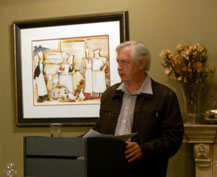Latest News Archive
Please select Category, Year, and then Month to display items
01 March 2023
|
Story Alicia Pienaar
 Prof Mathys Labuschagne is the Head of the Clinical Simulation and Skills Unit within the School of Biomedical Sciences in the Faculty of Health Sciences
Prof Mathys Labuschagne is the Head of the Clinical Simulation and Skills Unit within the School of Biomedical Sciences in the Faculty of Health Sciences
The Dean of the Faculty of Health Sciences, Prof Gert van Zyl, invites you to the inaugural lecture of Prof Mathys Labuschagne, Head of the Clinical Simulation and Skills Unit within the School of Biomedical Sciences in the Faculty of Health Sciences.
Subject: Clinical Simulation: Quo Vadis?
Venue: Auditorium, Equitas Building, Bloemfontein Campus
Date: 8 March 2023
Time: 17:30
RSVP on or before Friday 3 March 2023
Light refreshments will be served after the inaugural lecture.
About Prof M Labuschagne
Prof Mathys Labuschagne is the Head of the Clinical Simulation and Skills Unit within the School of Biomedical Sciences in the Faculty of Health Sciences at the University of the Free State. He completed his MB ChB degree and qualified as an ophthalmologist in 2006.
He developed an interest in health professions education and obtained a PhD in Health Professions Education in June 2012. The title of his thesis was: Clinical Simulation to enhance undergraduate medical education and training at the University of the Free State.
Prof Labuschagne was appointed Head of the Clinical Simulation and Skills Unit at the University of the Free State. The facility is utilised for undergraduate and postgraduate clinical simulation training, as well as interprofessional training and research. He has a special interest in simulation as training tool, precision skills training, and mastery of learning and simulation as tool to prepare students for interprofessional education and collaborative practice.
Prof Labuschagne is part of a multi-institutional consortium that developed the MySkills Medic app. It is a clinical procedural skills application aimed at graduating medical students, interns, and community-service doctors. He was appointed as a member of the Ophthalmology Foundation Education Simulation Subcommittee (affiliate of the International Council of Ophthalmology) tasked with developing a white paper to guide simulation training for ophthalmologists. He is involved in postgraduate supervision for master’s and PhD students in HPE.
Afrikaans place names were not only given by Afrikaner people, says professor.
2012-09-25
 |
Prof. Peter Raper delivering his lecture on South African place names.
25 September 2012 |
Prof. Peter Raper, honorary professor at the Department of Linguistics and Language Practice, delivered a public lecture in Clarens earlier this month. The theme of the lecture was “From Stone Age to GPS: The fourth edition of the South African Place Names Dictionary”.
Prof. Raper shared the historical development of the project as well as the challenges and other interesting observations associated with the topic. He elaborated on the dramatic change in the focus of his research on place names in South Africa.
It was previously assumed that all of the Afrikaans place names were given by the Afrikaner people and that changing these place names was consistent with the mandate of the South African Geographical Names Council (SAGNC) to transform place names. Prof. Raper said more in-depth research revealed that a significant number of place names are actually translations of original San names – into Afrikaans, Khoi and the Bantu languages. He told the audience that given the constitutional stipulation that no cultural group’s heritage may be removed, this discovery calls into the question the modus operandi of the SAGNC.
Prof. Raper’s lecture was part of the conference programme of the Third International MIDP IV Symposium that took place on the Qwaqwa campus. The MIDP (Multilingual Information Development Programme) is a project sponsored by the Province of Antwerp. The theme for this year’s symposium was “Multilingualism for Empowerment” and was presented in collaboration with the University of Antwerp.